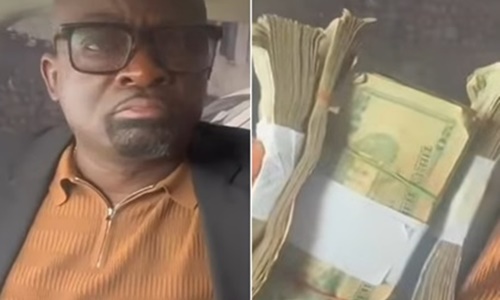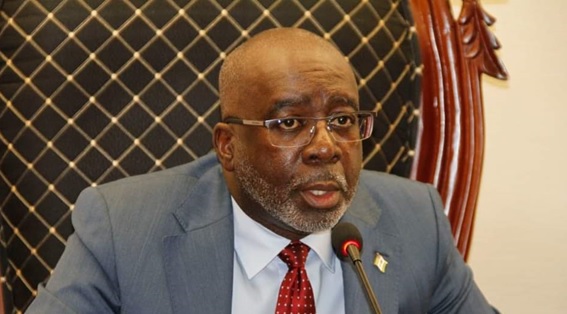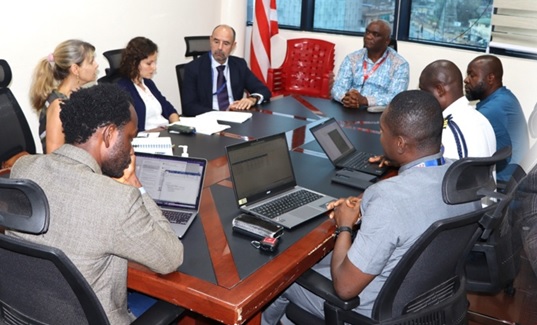MONROVIA – In a startling disclosure, Representative Luther Collins of District #2, Gbarpolu County, has exposed a bribery scheme allegedly designed to unseat the Speaker of Liberia’s 55th Legislature, Cllr. J. Fonati Koffa. During a live Facebook video on Thursday, October 17, 2024, Rep. Collins claimed he was offered US$25,000 as part of a larger conspiracy to impeach Speaker Koffa, reportedly spearheaded by Vice President Jeremiah Koung and Deputy Speaker Thomas Fallah.
In the video, Rep. Collins presented a cash sum of US$15,000, which he stated was the initial payment of the bribe. He also shared a list purportedly naming the lawmakers involved in the plot. According to Collins, this bribery attempt was part of a coordinated effort to destabilize the leadership of the House of Representatives, stemming from internal power struggles.
“For the past two days, rumors have been circulating around the Capitol building about impeaching Speaker Koffa,” Collins explained. “I was told the bribe offered was US$25,000 per lawmaker. I pretended to be part of the scheme in order to expose this corruption to the Liberian people. This is not in the best interest of our country.”
Collins further detailed how he infiltrated the conspiracy, obtaining part of the bribe and collecting evidence, including documentation of the alleged involvement of key officials. He accused Vice President Koung and Deputy Speaker Fallah of orchestrating the scheme to realign leadership within the powerful Ways, Means & Finance Committee, chaired by Rep. Dixon Seeboe, a close ally of Speaker Koffa.
Public Outcry and Allegations of Corruption
Political activist Martin K. N. Kollie strongly condemned the bribery allegations, describing the situation as a flagrant abuse of public trust. “This is how they squander public money amid increasing hardship, hunger, and unemployment. US$25,000 per lawmaker, while civil servants struggle to survive on $150 a month. In a serious country, the entire legislature would be dissolved by now. This is blatant corruption,” Kollie said.
Kollie’s comments echo widespread frustration among Liberians who view the scandal as emblematic of deeper systemic issues. He lamented that, despite the severity of the situation, little accountability is expected. “Liberia is a sad story,” he concluded.
Power Struggle in the Legislature
Beyond the bribery allegations, this scandal has unveiled a growing power struggle within the House of Representatives. Speaker Koffa and Deputy Speaker Fallah, both senior members of the opposition Coalition for Democratic Change (CDC), are locked in a fierce contest for control of the finance committee. Fallah’s alleged attempt to unseat Seeboe, a key Koffa ally, has deepened rifts within the CDC, risking a split in the former ruling party’s fragile unity.
Former President George Weah, the political leader of the CDC, has condemned the efforts to remove Speaker Koffa. Weah emphasized that internal conflicts only harm the party’s interests, urging members to focus on unity to secure the CDC’s political future.
Koffa’s Push for Transparency
At the heart of this controversy is Speaker Koffa’s commitment to transparency. Following his election as Speaker, Koffa made a historic decision to invite the General Auditing Commission (GAC) to audit the House of Representatives, marking the first formal review of the legislature’s finances in over 30 years. His push for accountability has garnered both praise and criticism, as some lawmakers see his reformist agenda as a challenge to the longstanding status quo.
As the bribery scandal and internal power struggle continue to unfold, the integrity of Liberia’s democratic institutions is under intense scrutiny. Speaker Koffa’s efforts to promote transparency may be at the center of a much larger battle to reshape the future of Liberia’s legislature, with implications for the nation’s governance as a whole.







